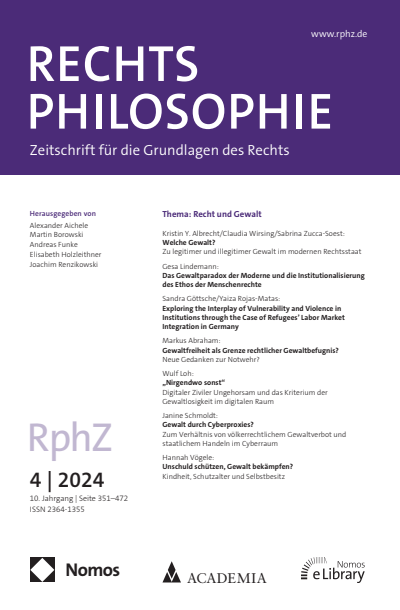SAFI is pleased to announce its newest publication, “Gewalt/Power,” in the prestigious Zeitschrift für Rechtsphilosophie (RPhZ). This issue, edited by Kristin Y. Albrecht, Claudia Wirsing, and Sabrina Zucca-Soest, builds upon discussions from SAFI’s second conference, which took place from May 28-30, 2021, focusing on the topic of “Gewalt”.

The contributions in this volume explore the concept of violence from various interdisciplinary perspectives, addressing its paradoxes, institutional manifestations, and normative implications. The articles include:
- Welche Gewalt? (Which Violence?) – Kristin Y. Albrecht, Claudia Wirsing, Sabrina Zucca-Soest
The concept of violence is central to contemporary debates, marking legitimacy in social and political contexts. Interdisciplinary disagreements concern its empirical, social, political, theoretical, and epistemic dimensions. The editors introduce the collection of essays which examine violence’s physical, psychological, sexual, economic, and structural forms. Employing diverse disciplinary perspectives, the essays aim to deepen the understanding of violence as a complex, intersubjective process within law and society. - Das Gewaltparadox der Moderne und die Institutionalisierung des Ethos der Menschenrechte (The Violence Paradox of Modernity and the Institutionalization of the Ethos of Human Rights) – Gesa Lindemann
Violence is not an isolated event. It is an event that can only be identified as violence within the framework of an interpretive order. Only by understanding the discursive rules and moral norms of a context can we speak meaningfully about violence. Based on this insight, the text develops a reflexive concept of violence that focuses on the close connection between violence and the formation and stabilization of norms. Historically different understandings of violence are reconstructed as procedural orders of violence. The modern, human-centered understanding of violence proves to be a historical phenomenon. There were orders that drew the boundaries of the social in a completely different way. This can be seen in comparison with other procedural orders of violence and norm formation. Analyzing violence in this way has strong implications for the possibilities of social critique. - Exploring the Interplay of Vulnerability and Violence in Institutions through the Case of Refugees’ Labor Market Integration in Germany – Sandra Göttsche, Yaiza Rojas-Matas
This article elaborates on how structural vulnerabilities can emerge in an institutional context. Looking at the structural violence-vulnerability nexus, we argue that there are vulnerant factors that constitute the link between a violent context and the probability of risk related to vulnerability. In particular, we analyze the Jobcenter in Germany and refugees’ path towards labor market integration. We take a closer look at those vulnerant factors that specifically affect refugees’ lives in contrast to non-refugees. Namely, an unclear residency permit perspective, language barriers, a lack of bureaucratic understanding, a lack of certification, a lack of social integration, psychological problems, and subjective opinions of case managers. Finally, we provide policy recommendations on how to reduce refugees’ structural vulnerabilities in this context. - Gewaltfreiheit als Grenze rechtlicher Gewaltbefugnis? (Non-Violence as a Limit to Legal Use of Force?) – Markus Abraham
Butler’s concept of nonviolence aims at questioning narratives that validate violence. In this paper, I evaluate the efficacy of her analysis by examining the most cogent instance of violence justification, i. e., the institution of self-defense. I show that her argumentation largely concerns the abusive invocation of self-defense rather than its legitimatory kernel. However, Butler offers two novel arguments that hold promise for challenging the justification of violence via the idea of self-defense. - „Nirgendwo sonst“ (“Nowhere Else”) – Wulf Loh
In digital protest, leaking and doxing differ fundamentally in their ethical implications as acts of civil disobedience. Leaking – defined as the careful, unauthorized release of confidential information – can be seen as a justified, non-violent form of protest aligned with civil disobedience principles. In contrast, doxing, which involves publicly exposing individuals’ personal information to shame or coerce, inherently entails indirect violence that infringes upon the target’s personal and symbolic integrity. Consequently, the paper argues that only leaking qualifies as ethical digital civil disobedience, while doxing fails to meet this standard. - Gewalt durch Cyberproxies? (Violence through Cyber Proxies?) – Janine Schmoldt
I discuss Article 2(4) of the UN Charter on the prohibition on the threat or use of force in the light of cyber-attacks and cyberwarfare. The article highlights that States could skirt this rule by employing so called cyber proxies who are not only able to avoid attribution but also provide a certain degree of plausible deniability. Unless a state-proxy relationship can be established, Article 2(4) of the UN Charter is completely meaningless. In that sense, I argue that States relying on cyber proxies could achieve political or economic objectives and use force in cyberspace without the need to adhere to the rules of the UN Charta in particular, and international law in general. - Unschuld schützen, Gewalt bekämpfen? (Protecting the Innocent, Combating Violence?) – Hannah Vögele
This paper challenges the idea of the protection of innocence as a shield against violence. The social, political, and legal treatment of children most clearly articulates how violence and the protection of innocence are but two sides of the same coin. Histories and presents of sexual and medical age of consent legislation show political contentions over what and who deserves protection. This also underlines the limitations and conditionalities of concepts of self-ownership, especially for – but not limited to – children.
We extend our heartfelt gratitude to all the authors and our peer reviewers for their patience throughout the sometimes rigorous but always constructive peer review process—we are all the more delighted to see this outstanding volume come to fruition!
For more details, please visit RphZ Rechtsphilosophie – Nomos eLibrary.